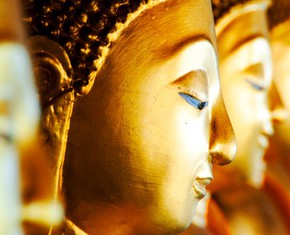The views expressed in our content reflect individual perspectives and do not represent the authoritative views of the Baha'i Faith.
When you become a Baha’i, you not only embark on a personal path of spiritual growth, but you join a Baha’i community—which may be one of the most important parts of that path.
The Baha’i Center in Nashville was, in the 1950’s, a well-kept white frame house just off the Vanderbilt University Campus. The Baha’i community itself was about half white and half African-American. Most were lower middle class economically, but the major were extremely well-educated, erudite, and knowledgeable about the Baha’i teachings, and many would go on to render great service to the Baha’i Faith and to humanity in a variety of capacities.
But all this I discovered gradually, and only now in looking back do I realize how greatly blessed I was to have my initial introduction to the Baha’i community occur amid the wonderful souls. There was Robert and Erma Hayden—he was a poet and professor at Fisk, and she was a concert pianist. The year I became a Baha’i, he published his first widely celebrated volume of poetry, A Ballad of Remembrance, which six years later won for him the grand prize at the Third World Festival of Negro arts held in Dakar, Senegal. He and I were good friends, and I enjoyed visiting his house and having long conversations about art and religion. I was an aspiring sculptor at the time and carved for him in stone at his request a primitive piece based on Brancusi’s light hearted version of “The Kiss.”
Robert and Erma would later move to Ann Arbor where he would teach at the University of Michigan. By the time of his death in 1980, he had established for himself a literary reputation that is still ascending. He was the first African-American to be appointed Poet Laureate (Consultant in Poetry to the Library of Congress), and after his death I would be privileged to participate in a festival celebrating his life at the University of Michigan where I gave a paper in his honor. In 1983 I published a definitive study of his life and art, From the Auroral Darkness: The Life and Poetry of Robert E. Hayden.
Besides my brother, my first important teacher in the Baha’i Faith was Winston Evans, a dignified man then in his late forties who had once been a multi-millionaire, only to lose it all in the 1929 stock market crash. When I met Winston he was then, and continued to be, a central figure utilized by the national Baha’i community to make contact with religious and secular scholars to inform them about the Baha’i Faith. He would often recount for me his encounters with figures such as Paul Tillich, Billy Graham, and others. Many a night at my apartment he would tell me the life histories of early Baha’is—those who went on to serve sacrificially in the field of service to the Baha’i principles and ideals.
There was Magdalene Carney, an unassuming but brilliant young African-American woman who became a Baha’i about the same time I did. She had a wonderful sense of humor and a strength of character and steadfast devotion celebrated even today. Today, a well-established training center in Florida bears her name, The Magdalene Carney Baha’i Institute.
There was Sarah Pereira, an African American university professor in Spanish, who the next year would be elected to the National Spiritual Assembly of the Baha’is of the United States. She was an indomitable character, articulate and extremely refined—and not one to mince words or brook inappropriate behavior. Sarah was a pillar of dignity, scholarship, and depth, and she often coaxed me and others to follow her lead as much as we were able.
There were the Waltons, the wonderful Waltons—Casey, his wife Alice, and their beautiful and charming daughter Marcia. These people could melt the most hardened heart with their kindness and love. In their presence I felt as if I were with part of my family, and whenever in future years I would see Casey, especially at the national Baha’i conventions, his smile would take me back to those early days of my life as a Baha’i in Nashville. Both he and Alice would serve the Faith in a number of capacities.
There was Mary Watkins, an editor at the Methodist Publishing House, who became like a second mother to me. She lived alone, and her home became a gathering place for me and for several young Persian Baha’i men who, without her guidance and solace, would have been utterly lost in this strange amalgamation of colleges, universities, and country music that was Nashville. She would go on to edit a wonderful book for David Hoffman on the biography of Baha’i teacher George Townshend. In her presence there was peace and love, intelligence and joy.
The list could go on and on, about Roy and Georgia Miller, about Tommy Thompson, about Dr. Jazaab, his wife and daughters. I am sure that if something has not yet been written about that community, there will be a powerful history written someday. But the foundation for all that community is today was established long ago, and my small part in that foundation was a special time amid a special assemblage of singular, remarkable individuals. Being able to have my beginnings as a Baha’i fashioned in the nurturing ambience of that rarified atmosphere stood me in good stead for the decades to come.
I learned from all of those incredible people that the Baha’i teachings and texts should be my standard, the balance against which I weigh my character, my decisions, and the efficacy of those ideas and decisions proffered me by others. While I have not always kept the scales balanced, I have always known when they were out of kilter. I would no more abandon that than I would take my own life.
I want to thank the Baha’is who nurtured me in Nashville as a new believer—they truly helped me understand the balance of life:
By Him Who is the Great Announcement! The All-Merciful is come invested with undoubted sovereignty. The Balance hath been appointed, and all them that dwell on earth have been gathered together. – Baha’u’llah, Gleanings from the Writings of Baha’u’llah, p. 39.
















Comments
Sign in or create an account
Continue with Googleor